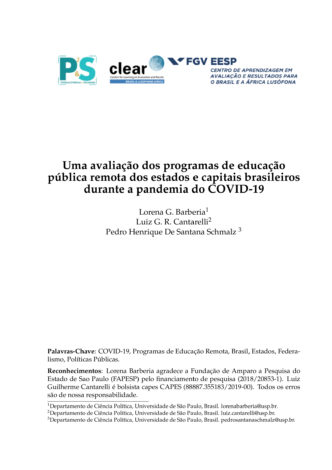Abstract
School closures were one of the policies adopted worldwide for containment of the COVID-19 pandemic. While this type of non-pharmaceutical intervention has proven to be an effective policy to reduce virus transmission, there has not been a systematic investigation to verify if governments implemented remote education programs to continue to deliver education to students. In Brazil’s case, due to the lack of effective control of the pandemic, schools remained closed for in-person schooling over a prolonged period for the majority of the 2020 academic year. In developing countries, such as Brazil, this can increase education inequalities, especially if access to remote learning technologies is limited for vulnerable populations. In this working paper, we report the results of a novel effort to collect data to document the types of programs adopted by state and state capitals’ governments to deliver remote schooling during the pandemic. We measure the duration, scope, and coverage of remote public education programs through quantitative indicators and an index that measures the overall quality of remote education programs in early childhood, primary and secondary education in Brazil in 2020. Our research reveals that there were significant delays in the adoption of these programs by both state and municipal governments. Furthermore, our findings confirm that the programs dedicated insufficient attention to ensuring access to technologies that would encourage learning, interaction and supervision of students remotely. We then show that remote education programs are correlated with previous economic and educational conditions and use survey data collected from households across Brazil to show that remote education programs affected educational outcomes. We conclude by noting that the evidence collected in our report underscores that greater attention must be directed to the challenges and problems encountered in implementing remote education programs. The available evidence suggests that policies must be designed to address the preexisting, now augmented, unequal access and unequal provision of education for vulnerable groups.
Download the complete PDF report.


